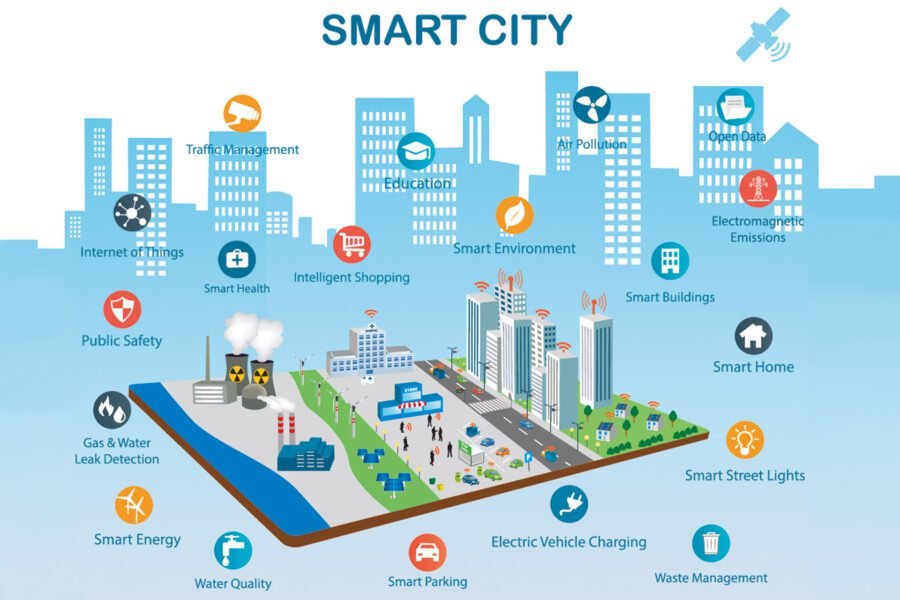
Tech-Infused Urban Living: Smart Cities’ Real Estate Revolution
Smart cities are reshaping the real estate landscape through the integration of innovative technologies. From intelligent infrastructure to data-driven decision-making, the convergence of real estate and technology is transforming urban living in unprecedented ways.
The Rise of Smart Cities in Real Estate
Smart cities represent a paradigm shift in urban development, leveraging technology to enhance efficiency, sustainability, and the overall quality of life for residents. In the real estate sector, this shift is palpable, with smart technologies becoming integral components of urban planning and development projects.
Intelligent Infrastructure and Connectivity
One of the key impacts of technology on smart cities is the development of intelligent infrastructure. Smart buildings equipped with IoT (Internet of Things) devices, sensors, and connectivity solutions are becoming standard features in urban real estate. These technologies enhance energy efficiency, streamline maintenance, and create more responsive and comfortable living spaces.
Data-Driven Decision-Making in Urban Development
Smart cities rely heavily on data-driven decision-making processes to optimize urban development. Real estate developers and city planners utilize data analytics and predictive modeling to make informed decisions about land use, infrastructure investments, and community development. This data-centric approach enhances the effectiveness and sustainability of urban projects.
Smart Homes and Residential Real Estate
The integration of technology extends into residential real estate with the rise of smart homes. Home automation systems, smart appliances, and security features controlled through mobile devices are transforming the way individuals interact with their living spaces. Smart homes not only enhance convenience but also contribute to energy savings and sustainability.
Enhanced Mobility and Transportation Solutions
Smart cities prioritize intelligent mobility solutions to address urban transportation challenges. Real estate development projects often incorporate smart transportation infrastructure, such as electric vehicle charging stations, smart traffic management systems, and integrated public transportation options. These advancements enhance accessibility and contribute to more sustainable urban mobility.
Sustainability and Energy Efficiency in Real Estate
Technology plays a pivotal role in advancing sustainability goals within smart cities’ real estate. Smart buildings leverage energy-efficient systems, renewable energy sources, and real-time monitoring to minimize environmental impact. This commitment to sustainability aligns with global efforts to create more eco-friendly and resilient urban environments.
Digital Connectivity and Smart Urban Planning
Digital connectivity is a cornerstone of smart urban planning, impacting real estate development at its core. The integration of 5G networks, Wi-Fi connectivity, and smart infrastructure ensures that residents have seamless access to digital services. This connectivity is essential for the implementation of smart technologies and the overall success of smart city initiatives.
Enhancing Urban Security with Technology
Real estate technology in smart cities extends to enhancing urban security. Smart surveillance systems, facial recognition, and IoT-enabled security devices contribute to safer urban environments. These technologies are integrated into real estate developments to provide residents with a secure and technologically advanced living experience.
The Role of Blockchain in Real Estate Transactions
Blockchain technology is making inroads into real estate transactions within smart cities. The use of blockchain ensures transparency, reduces fraud, and streamlines property transactions. Smart contracts on blockchain platforms automate and secure real estate processes, providing efficiency and trust in property dealings.
Resilient Cities in the Face of Challenges
The integration of technology in smart cities’ real estate makes urban areas more resilient in the face of challenges. Whether addressing climate change, responding to pandemics, or optimizing resource utilization, smart technologies contribute to the adaptability and sustainability of urban living.
Explore Smart Cities Real Estate Technology
To delve deeper into the transformative impact of technology on smart cities’ real estate, visit Smart Cities Real Estate Technology. Discover how the convergence of real estate and technology is redefining urban living, creating intelligent, connected, and sustainable cities for the future.
In conclusion, the fusion of real estate and technology in smart cities represents a revolutionary force in urban development. From intelligent infrastructure and data-driven decision-making to enhanced mobility solutions and blockchain in real estate transactions, technology is shaping urban living for increased efficiency, sustainability, and resilience. As smart cities continue to evolve, the integration of cutting-edge technologies into real estate will play a central role in creating cities that are not only smart but also responsive to the needs of their residents.
